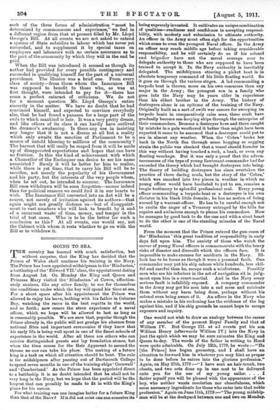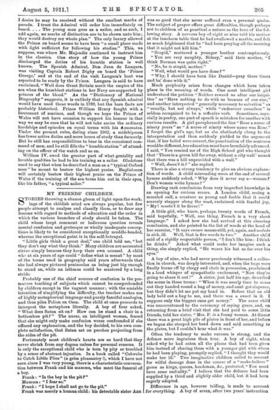GOING TO SEA.
THE country has learned with much satisfaction, but without surprise, that the King has decided that the Prince of Wales shall continue his training in the Navy. The Prince has been appointed midshipman in the' Hindustan,' a battleship of the ' Edward VII.' class, the appointment dating from August 1st. On Monday the King and Queen and Princess Mary visited the Hindustan' at Cowes, affection- ately anxious, like any other family, to see for themselves the conditions under which the boy will spend his time at sea. For a. short space after his appointment the Prince was allowed to enjoy his leave, bathing with his father in Osborne Bay, watching the races in the best regatta in the world, and so forth; now comes the stern experience of a naval officer, which we hope will be allowed to last as long as is reasonably possible. We are sure that, popular though the Prince already is, the public will not grudge his absence from national fetes and important ceremonies if they know that his early life is being well spent in one of the finest schools of experience in the world. After all there are others who can receive distinguished guests and lay foundation stones, but when the time comes for the Heir Apparent to ascend the throne no one can take his place. The making of a future king is a task on which all attention should be bent. The rule is for midshipmen after passing out of Dartmouth College to spend seven months in one of the training-ships' Cornwall' and Cumberland.' As the Prince has been appointed direct to a battleship it is no doubt intended that he shall not be very long in the Navy, but we hope that the period will be the longest that can possibly be made to fit in with the King's plans for his career.
For what training can one imagine better for a future King than that of the Navy P If it did not exist one can conceive its being expressly invented. It cultivates an unique combination of qualities—readiness and confidence in accepting responsi- bility, with modesty and submission to ultimate authority. An officer in the Army must often sigh for the opportunities which come to even the youngest Naval officer. In the Army an officer may reach middle age before taking considerable responsibility, and he will certainly do so if his colonel and brigadier have not the moral couraa-e ever to delegate authority to those who are supposed to have been trained to accept it. In the Navy authority is inevitably delegated. The midshipman steering a picket boat is in absolute temporary command of his little floating world. So it goes on through the various stages. A lad commanding a torpedo boat is thrown more on his own resources than any major in the Army ; the youngest son in a family who goes into the Navy may be years older in experience than his eldest brother in the Army. The history of destroyers alone is an epitome of the training of the Navy. Originally built as a sort of swift war canoes for swooping on torpedo boats in comparatively calm seas, these craft have gradually become sea-keeping ships through the enterprise of their commanders. Because a destroyer here and there caught by mistake in a gale weathered it better than might have been expected it came to be assumed that a destroyer could put to sea in almost any weather. When the ' Cobra broke her back in. the North Sea. through some hogging or sagging strain the public was shocked that a vessel should founder in this way without having touched a rock, a bank, or even any floating wreckage. But it was only a proof that the adven- turousness of the type of young lieutenant-commander had far exceeded the theory which had brought destroyers into being. The theory of building destroyers has since overtaken the practice of these daring souls, but the story of the Cobra,' which was smashed into two pieces in weather in which no young officer would have hesitated to put to sea, remains a tragic testimony to splendid professional zeal. Every young officer commanding a torpedo-boat or a destroyer is his own dictator in his black little domain ; he has no notion of being nursed by a warrant-officer. He has to he careful enough not to excite the anger of a Treasury outraged by the bills for repairs and audacious enough to please his commodore. How he manages by good luck to do the one and with a stout heart to do the other is one of the standing miracles of the Naval world.
From the moment that the Prince entered the gun-room of the 'Hindustan' this great tradition of responsibility in early days fell upon him. The anxiety of those who watch the career of young Naval officers is commensurate with the heavy risks of disaster and discredit which the officers face. It is impossible to make excuses for accidents in the Navy. Ill- luck has to be borne as though it were a personal fault. One commander may put his ship ashore while hundreds, less skil- ful and careful than he, escape such a misfortune. Possibly men who are his inferiors in the art of navigation sit in judg- ment upon him in a court-martial. And in the Navy every serious fault is infallibly exposed. A company commander in the Army may get his men into a sad mess and extricate them without any harm being done, perhaps without his colonel even being aware of it. An officer in the Navy who makes a mistake in his reckoning has the evidence of the log against him, and if his ship grounds he cannot hope to escape exposure and inquiry.
One would not wish to draw an analogy between the career of any member of the present Royal Family and that of William IV. But George 1II. at al events put his son William Henry (afterwards William IV.) into the Navy in just the spirit which we may be sure animates the King and Queen to-day. The words of the father in writing to Hood were quite admirable. On July 12th, 1778, he wrote:—"He [the Prince] has begun geometry, and I shall have an attention to forward him in whatever you may hint as proper to be done before he enters into the glorious profession." Again, on May 27th, 1779 :—" I have sent an hair-trunk, two chests, and two cots done up in one mat to be delivered unto you for the use of my young sailor. . . . I flatter myself you will be pleased with the appearance of the boy, who neither wants resolution nor cheerfulness, which seem necessary ingredients for those who enter into that noble profession." Again on June llth, 1779 :—" The young midship- man will be at the dockyard between one and two on Monday.
I desire he may be received without the smallest marks of parade. I trust the Admiral will order him immediately on board. . . . The young man goes as a sailor, and as such, I add again, no marks of distinction are to be shown unto him; they would destroy my whole plan." The only luxury allowed the Prince on board seems to have been "a small place made with light sufficient for following his studies." This, we suppose, was where Mr. Majendie continued to instruct him in the classics. One story of how the young Prince discharged the duties of his bumble station is well known. The Spanish Admiral, Don Juan de Langara, was visiting Captain Robert Digby on board the 'Prince George,' and at the end of the visit Langara's boat was reported to be ready by the Prince. Langara is said to have exclaimed, " Well does Great Britain merit the empire of the sea when the humblest stations in her Navy are supported by princes of the blood." As the " Dictionary of National Biography" suggests, it is unlikely that any Spanish admiral would have used these words in 1780, but the bare facts are probably historical. Prince William Henry fought with a lieutenant of marines, and though we hope the Prince of Wales will not have occasion to support his honour in that way we may be sure that he will not take amiss the ordinary hardships and episodes on equal terms with his kessmates. Under the present rules, dating since 1902, a midshipman has fewer active duties and more hours of study than formerly. But he still has responsibilities to bear in the occasional com- mand of men, and he still fills the " humble station " of attend- ing on the officer of the watch and so on.
William IV. owed the greater part of what geniality and lovable qualities he had to his training as a sailor. Gladstone used to say that when he described a man as a " typical Oxford man " he meant to bestow the highest praise. Englishmen will certainly bestow their highest praise on the Prince of Wales if the training of the sea turns him out in their eyes, like his father, "a typical sailor."







































 Previous page
Previous page